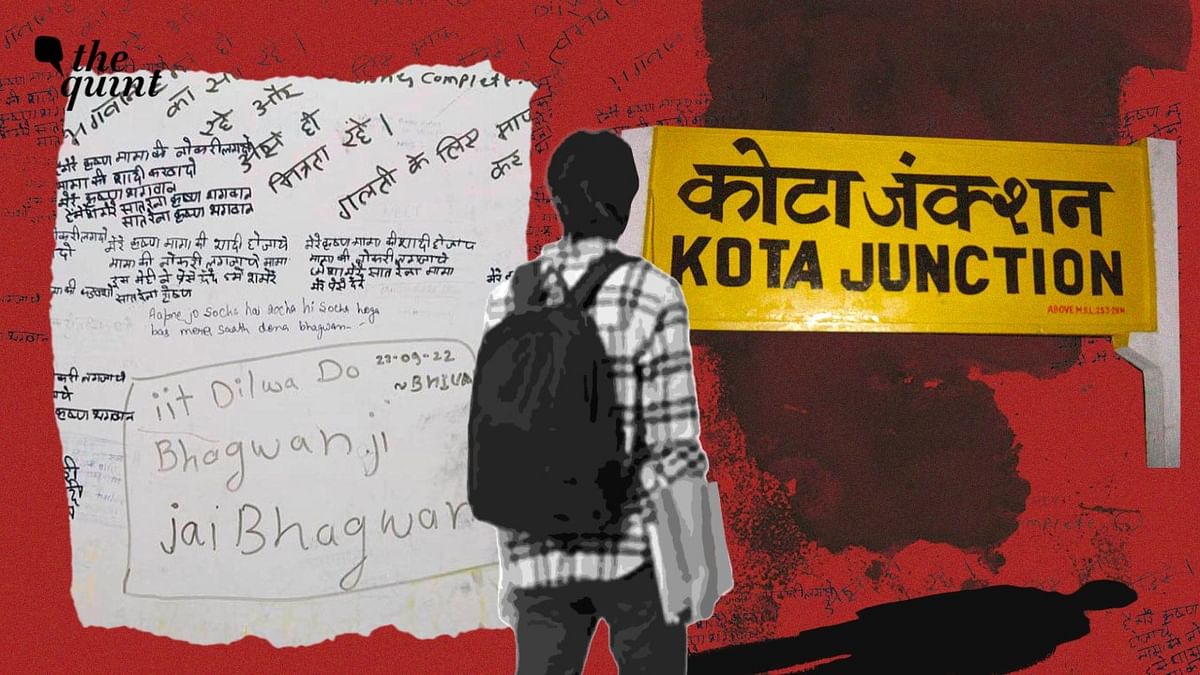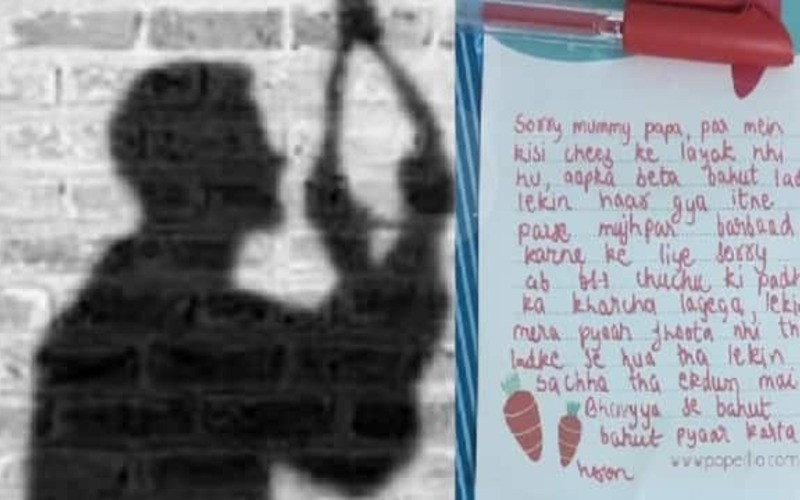Kota, From A Land Of Dreams To A Ghost Town; The Silent Sufferers And The Struggles Of Students In Kota
A small town named Kota has become a story of both ambition and adversity. Known for its coaching centers and the aspirations they nurture, Kota has etched itself into the nation's collective psyche, and not in a good way. Beneath the veneer of success stories (a few) and academic excellence lies a grim reality that has been haunting the town for years—student suicides. Every year, as the doors of these coaching institutes swing open, they welcome not only eager minds but also an overwhelming burden of expectations, competition, and stress. The corridors that echo with dreams of success also bear witness to the silent cries of those who falter under the weight of the race. Far worse is that the trend of suicides has led to yet another sprawling business for these enterprising businessmen, but at what cost? A huge one, indeed! What are the reasons behind the complexities of this distressing trend? What factors drive students to such desperate measures? And most importantly, what can be done about it?

Kota, The Ghost Town
Kota is where dreams and aspirations collide with harsh reality, a place that has unwittingly become synonymous with both success and despair.
Every year, a sea of young minds from across the nation pours into this education hub, their eyes filled with ambition and their hearts brimming with hope.
They come seeking a shot at the future they’ve been promised, an opportunity to crack the competitive exams that will propel them into prestigious engineering and medical institutions; however, what awaits them in Kota is a reality far more complex and tumultuous than they could have ever imagined.

The Ghost Town
The distressing trend of student suicides in Kota has cast a chilling shadow over this town. Every year, scores of teenagers succumb to the immense pressure of preparing for entrance exams, leading to a growing concern about the mental well-being of these young aspirants.
What’s driving these students to such extreme measures? Why is the pressure to perform becoming an impossible burden?
The stark numbers paint a grim picture: 15 suicides last year, 22 already this year, and countless more in the years before. Behind each of these tragic stories lies a tale of struggle, isolation, and unrelenting pressure.
These students come with dreams in their eyes, but they also bring the expectations of their families, the burden of loans taken, and the societal pressure of succeeding at any cost.
Saumya Kumari’s journey from Jharkhand to Kota is a poignant example of someone who arrived with a strong academic record, hoping to replicate her past successes.

However, the transition proved brutal, as is the case with many students; the cutthroat competition and demanding syllabi took a toll on her mental health.
Saumya struggled to find her footing in a new environment, grappling with peer pressure and parental expectations that seemed to weigh her down more than her textbooks.
Ishita Goel, an IIT JEE aspirant, points out the difficulties newcomers face in adapting to Kota’s unique atmosphere.
According to her, it’s not just about the syllabus; it’s about the adjustment to an environment that can sometimes feel like a pressure cooker, leaving students feeling overwhelmed and lost.
Kota’s rise as an educational hub has been remarkable, transforming the town into a bustling center for coaching institutions, but it has come at a huge cost; while the competitive coaching industry has thrived, minting money from the dreams of lakhs of students, it has also in its wake left many with little option but to end their precious lives!
Amid the glittering promises, the cracks have grown larger, with students from small towns and underprivileged backgrounds feeling lost in the middle of this educational frenzy and with little help to cope.

The Undeniable Factors
District Collector OP Bunkar’s statement that parental pressure is to blame echoes the sentiments of many.
Students find themselves trapped in a cycle of expectations, constantly judged by their performance, often regardless of their emotional well-being.
The fear of disappointing their families or incurring the burden of financial investment forces them to endure unimaginable stress.
The coaching industry’s rapid growth has led to a lopsided teacher-student ratio, leaving many students without the individual attention they need.
Financial strain, too, plays a significant role, with the cost of coaching in Kota ranging from Rs 1.5 lakh to Rs 5 lakh per year. For many families, this is an enormous investment, adding an extra layer of pressure on the students to succeed.
Despite the presence of helplines, counsellors, and support systems, student suicides continue.
This begs the question: Are we doing enough? Are we addressing the core issues that are driving these young minds to despair?

The stories of these students, who come to Kota with dreams in their hearts, only to face a reality rife with competition and anxiety, should force us to confront these questions.
Kota, once a town that breathed life into dreams, now finds itself grappling with a reputation it never asked for—the suicide capital of the state.
The silent suffering of students in this educational pressure cooker demands urgent attention. It’s time to shift the focus from mere academic success to holistic well-being, to listen to the cries behind the closed doors of hostels and classrooms, and to create an environment where the pursuit of knowledge doesn’t come at the cost of young lives.

The Unintended Business of Desperation
Amid the towering edifices of coaching institutes and the whispered dreams of success, another industry has quietly taken root in Kota, thriving in the shadows of its educational fervor.
This industry is not driven by the ambition of students but by the desperation of parents, who are grappling with the fear of their children’s perceived inadequacy in the face of cutthroat competition.
As student suicides cast a grim pall over Kota, parents are resorting to an extraordinary measure—uprooting their lives and relocating to this town, all in the hope of safeguarding their children’s dreams.
The rise of Kota as an education hub is, in many ways, a reflection of the collective aspirations of families across the nation. Students flock to this town with dreams of conquering prestigious exams and securing a spot in coveted institutions. However, the cost of this dream is becoming increasingly apparent, and parents are willing to pay it in ways that extend beyond financial investment.

The stories of parents renting 1BHK flats, leaving behind jobs, and even relocating their entire families are becoming more commonplace. The frantic pace of the coaching industry has brought forth a new business opportunity—the provision of safe, monitored living spaces for students and their guardians.
Kota’s landscape is now dotted with hostels, PG accommodations, and residential areas, all catering to the unique needs of families who’ve uprooted themselves in the pursuit of their children’s success.
These parents, driven by a mix of fear and aspiration, have turned to a desperate solution. They believe that their presence will shield their children from the pitfalls that have claimed so many young lives.
The irony is palpable: while the coaching industry was initially established to propel students forward, it is now generating an entirely different economy—one that revolves around parents’ overwhelming need to protect their children from the pressures it creates.
Vinod Gautam, owner of a girls’ hostel in Kota, highlights the lengths to which parents go to ensure their children’s safety. From biometric systems to e-rickshaws, every aspect of student life is carefully monitored and managed.
Safety has been redefined, not in terms of personal growth or emotional well-being, but in terms of physical protection from the self-inflicted harm that has become alarmingly frequent.
Kota’s educational landscape is now intertwined with the lives of these parents who’ve moved to the town to become protectors as much as providers. Their sacrifices are a poignant reflection of the lengths to which they’ll go to see their children succeed. Yet, amidst this backdrop, the question remains: Is this the solution we need?
While the parental concern is undeniably well-intentioned, this migration of families also underscores a deeper issue—that our education system has become an arena of distress and desperation. Parents are grappling not just with their children’s aspirations but with a system that thrives on competition and often disregards mental well-being.
The story of Kota’s students is one of ambition and agony, of dreams and despair. But now, as parents add their narratives to this evil story, it’s clear that we’re facing a crisis that goes beyond exams and scores.
It’s a crisis of values, of priorities, and of a system that demands everything from our children but sometimes fails to give them the space to simply be children.
As Kota’s educational ecosystem evolves, it’s imperative that we question not just the pressure on students, but also the reasons behind parents’ drastic measures. Only then can we hope to create an environment where dreams can be pursued without becoming nightmares!
The Final Arch
Kota’s struggle against the rising tide of student suicides unveils a larger narrative about the state of our education system and the expectations we heap upon our youth.
It tells us that academic success, while valuable, cannot come at the cost of mental well-being and holistic growth. The battle against student suicides calls for a comprehensive reevaluation of our priorities. As a society, we must consider not just the grades and scores that define achievement but the emotional resilience and personal development that build the foundation for a successful and fulfilling life.
The road ahead for Kota—and indeed for the entire education sector—must involve a collaborative effort. Coaching institutes, parents, educators, and policymakers must unite to reshape the description surrounding success, creating an environment that nurtures talent without sacrificing well-being.
It’s a collective responsibility to transform Kota from a town haunted by despair to a place that fosters hope, growth, and compassion.
The path is undoubtedly challenging, but it’s not insurmountable. Just as the sun rises each day over Kota, we can aspire to bring a new dawn of understanding, support, and awareness to the lives of these young learners.
The Last Bit, It is not just about preparing students for exams; it’s about preparing them for life, equipping them with the resilience and tools they need to face challenges head-on; only and only then can Kota truly shine as a beacon of education, progress, and empathy for the generations to come.





